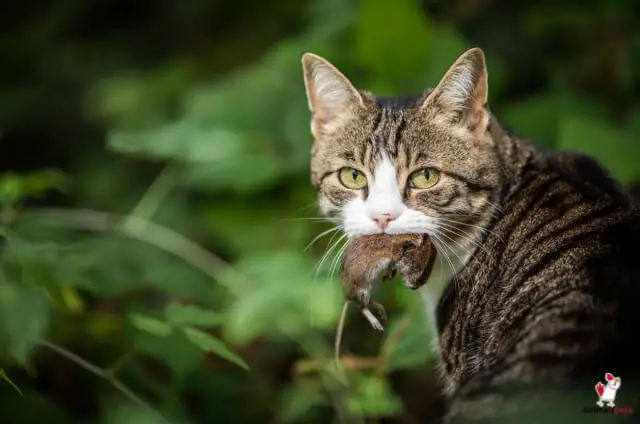This answer to this ubiquitous question depends on the type of cat you are asking about. If you’re talking about a house (domesticated, tamed) cat, those are unlikely to eat mice. If the focus is on wild or feral cats, those felines will instantly eat mice as soon as they kill them. This is because since they were kittens, feral cats were taught that their survival depends on killing mice. So, hunting and taking down mice is something they do out of instinct. Domesticated cats may hunt mice, but they will neither kill nor eat them.
Cats And Deterring Mice – Can The Felines Take Care Of Rodent Issues?
The article is about to take a deterrent direction if you know what I mean. If your house is infested with rodents, you are likely to bring in a cat to the rescue. I mean, isn’t that the most apparent and sort-after solution? But, dealing with a mice infestation isn’t that simple. Having the cat present in the house is not enough to keep all the mice away.
The cat’s smell may deter mice from making rounds in your home. Since cats are the direct predators of mice, mice have picked their scent over time. So, they will stay away from the limelight. But, the rodents will still occupy crawlspaces, attic, and chinks in the wall. In those spaces, they will continue to feel anxious because they can detect the cat’s odor. When that happens, they will get inspired to reproduce. Thus, the number of mice in the house will increase exponentially. The reason why the mating occurs is for the rodents to ensure that their species is maintained.
Thankfully and fortunately, cats can play a vital role in long-term mice deterrence. You need to do work together with the cat as one team. The primary function of the cat will be to help you identify where the mice are hiding. When you are well informed, you can work on clearing the infestation. This will ensure that the mice issue does not reoccur.
Taking Down The Rodents: How Cats Sense Mice
Since cats are born hunters, they will know if and when you have rodents infesting your house. The one thing that stands out about cats is their keen art of listening. On top of that, their smelling sense is excellent. If any prey animal is present, cats will never lack the interest in paying attention and exploring.
If you suspect that a rodent problem is brewing in your house, your cat will likely confirm all your suspicions. The following table shows some of the behaviors that may be exhibited by a cat who thinks mice are in your house:
| Cat Behavior While Detecting A Mice Infestation | |
| Behavior | Explanation |
| Staring at the concrete walls | The cat could have seen a mouse rushing through a space in the wall. |
| Intently listening to floors and walls | The feline may have heard small movements made by the mice behind the wall or floor. |
| Leading you to a location and verbalizing | The cat may have narrowed down to a specific place where it thinks the mice are |
| Having an enhanced interest in a particular location | This behavior, too, shows that the cat may have spotted the specific place where the mice could probably be hiding. |
| Maintaining a pose akin to that of a hunting cat | With this behavior, you will see the cat crouching its body. Then, its ears will move forward, and its tail will go low. Also, its eyes will become dilated. |
The behaviors tabulated above show that the cat has identified a mice issue in your house. If the cats know that you have mice, do the mice have it in mind that you have a cat? If they do, will they change how they behave? Read on and find out.
Can Mice Know If Your Cat Is Around?
We may never notice it, but mice have already picked it out – cats carry a powerful scent. Since mice are prey species, they will always be on their guard. Brain Research notes that mice have vomeronasal organs, which help to enhance their sense of smell.
Mice will pick the smell of a cat’s urine and any and every dander that the cat sheds. Theoretically speaking, it means that when a cat is in a home, mice will stay away from that home. Practically and realistically speaking, the equation is only half-solved.
If the mice have found a comfortable nest, they will stick there whether there is a cat or not. As mentioned previously, the mice could be nesting in a crawlspace, an attic, or even your home’s walls. The mice will try hard to stay in places where cats cannot reach. Also, they will step up on their breeding game.
Will My Cat Really Keep The Mice Out?
While the short answer to the question is yes, it comes with caveats. If you have a mice overpopulation in your house, a cat may not take care of the infestation single-handedly. Rodents are smart – smarter than we even credit them. As discussed in this piece, mice may still choose to nest on the darker and unexplored places of your property.
To wrap our heads around this issue, we need to know how mice think. Mice need a constant supply of food and will always try to nest in spaces near sources of their essential needs. Once they establish their spot, they will mark it as their territory. Within one month, a female mouse can give birth to around 30 babies.
As you may imagine, 30 baby mice mean that lots of mouths need feeding. So, mice will hunt all over for food. Their drive becomes the cause of destruction as the rodents will invade your pantries, cupboards, and everywhere they can pick the smell of food. If your cat has active hunting instincts and the mice know about it, the mice will stop the invasion. They will always have it in mind that a cat is lingering around. When they see the cat nearby, they will steer clear. Unfortunately, if the cat is only one, it cannot be at all places all the time. The mice, which will obviously be in larger numbers, will outnumber the cat. Therefore, the cat’s ability to deter them becomes limited.
With significant numbers also comes boldness. The mice may even start venturing outside their nests. They will master the cat’s movements and patterns to learn when it would be safe to step out. To stay on top of the situation, you may need to get a cat that has a high predatory drive.
So, Which Cats Have Crazy Prey Drives?
Like with any other domesticated pets, there are breeds of cats that retain many wild hunting instincts. If you’re looking for a species that has an almost-crazy and aggressive predatory drive, you can pick any of the following:
1. Turkish Angora
2. Siamese
3. Persian
4. Manx
5. Maine Coon
6. Japanese Bobtail
7. Burmese
8. Abyssinian
Adopting any of the breeds mentioned above doesn’t solve the mice problem completely. Since every cat has its personality, you should ensure that the individual feline has a temperament that is attack-minded.
Can I Borrow A Kitty Cat To Help My Mice Infestation Problem?
If you think that the mice infestation problem is short-term, you can be tempted to borrow a cat. When you get your houseguest cat, it may chase the mice off, but they will return once the cat returns to its home. Between their exit and their re-entry into your home, they will have significantly multiplied. Additionally, there are some considerations you need to make:
1. Cats usually take some time to settle comfortably in a new environment.
2. Your house may not be the best place for a cat to live, that is, it might not meet the needs of the feline.
3. Some cats will deliberately ignore mice and focus on wild birds.
4. The responsibility of the cat will squarely be on you.
PLOS One advises that for rodent prevention to be done well, cats need to be paired. If you have two cats living together, this pair can do better deterrence work. But first, you need to ensure that the paired animals co-exist peacefully.
Mice Takedown: How To Really Deal With A Rodent Problem
As mentioned elsewhere, most cats do not fancy eating mice, which is actually for the very best. This is because when cats eat mice, they become exposed to a couple of diseases. Instead of swallowing it whole, cats decide to present the captured mouse to its owner as a gift.
When you see the cat bringing you the mouse, you may feel delighted. But that is just one side of the coin. It means that all the other mice will have been alerted. They will be proactive and will act very cautiously since there is a shadow lurking. They may not get away from the house, but the mice will remain and ensure that they do not cross paths with the cat.
The best bet of altogether deterring mice is by calling an exterminator. While it may be expensive, it will take care of the job well. If you feel that you can’t dig into your pockets deeply, you can team up with your cat. That way, you will save on the money you would have spent on the exterminator. Also, you and your cat will deter and stop the mice from ever returning to the house.
How Will You Two Locate The Mice?
The initial step you need to make is finding out the exact place where the mice are nesting or hiding. For this step, your cat will be very invaluable. Give your cat a chance to do some exploring throughout the house. During the entire time, you need to watch your feline partner while it is going and conducting its business. If it seems to be showing particular and special interest in some innocuous part of the house, follow through. Pay specific interest to ceilings, floorboards, and walls. The cat is probably hearing mice moving behind these areas.
While you follow your cat partner, you need to look at the suspect parts of your home. Check for any mouse holes, which need not be too big. The dexterity of mice makes them squeeze their tiny bodies through even smaller spaces. If there are no holes, look at any loose floorboards.
If you find the entry point, let them remain open and do not board them up. This will only trap the mouse or mice you find within their territory. You will not have resolved the problem. In fact, the situation will be worse because, in confinement, they will breed profusely (see what I did there?). This means that the cat will be driven crazy.
You should make it very hard for the mice to access your home through the available holes. In the meantime, keep watching the cat’s movements since it will continue showing interest in the rodent hotbeds.
You should know that once the mice get wind that they are being pursued, they are likely to relocate to a different place in your house. Even when that happens, the cat will keep hunting them.

I’m Christopher Benjamin, a dedicated Animal Nutritionist at Ethos Veterinary Health with a Bachelor of Science in Animal Science from Michigan State University. My lifelong passion for animals led me to establish AnimalsData.Com. Here, I share expert advice, educational resources, and inspiring stories to empower fellow pet lovers worldwide. Join our community as we celebrate the beauty and diversity of our beloved animal companions!
